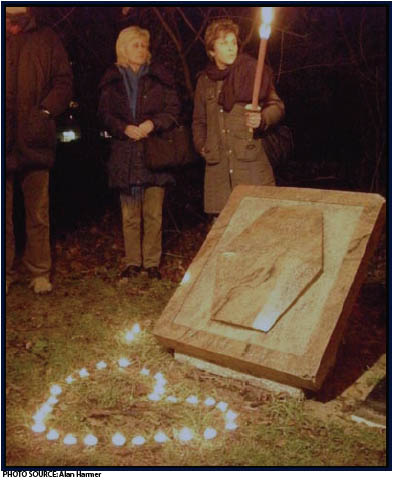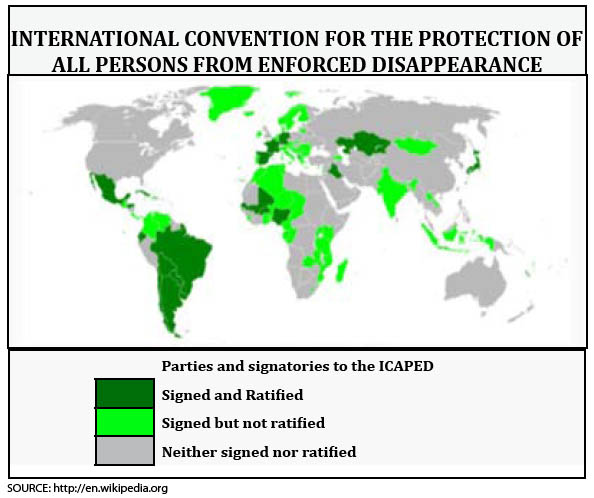Entry into Force of the International Convention for the
Protection of All Persons from Enforced Disappearance and Future
Perspectives
by Gabriella Citroni
Note by the author: This contribution is based on excerpts of the
transcript of an intervention communications (Arts. 31 and 32 of the
Convention).2 delivered by video-message on the occasion of the 4th Japan
has recognized only the competence of the Congress of the AFAD held in
Bogor, Indonesia on 1-5 Committee with regard to inter-State
communications June 2010. The contents have been updated due to (Art. 32
of the International Convention). the deposit of new ratifications to the
International Convention for the Protection of All Persons from If we
analyze the status of the International Enforced Disappearance (the
International Convention) Convention with regard to Asia (notably, the
continent and the entry into force of the treaty on 23 December with the
highest reported number of enforced 2010. disappearances to the United
Nations Working
Where does the International Convention stand?
 As
of the end of February 2011, the International Convention has been signed
by 88 States and ratified or acceded by 23 States.1
On 23 November 2010, Iraq became the 20th State party to the International
Convention and therefore, pursuant to Article 39 of the latter, the treaty
entered into force on 23 December 2010.
As
of the end of February 2011, the International Convention has been signed
by 88 States and ratified or acceded by 23 States.1
On 23 November 2010, Iraq became the 20th State party to the International
Convention and therefore, pursuant to Article 39 of the latter, the treaty
entered into force on 23 December 2010.
The entry into force of the International Convention is a major
achievement in the struggle against enforced disappearances as it will
constitute an effective means to eliminate this heinous practice and to
prevent it from happening again. Nevertheless, this has to be seen as a
first crucial step of a long trail.
First, it must be stressed that, out of the 23 States parties, only 7
have recognized the competence of the future Committee on Enforced
Disappearance to receive and examine inter-State and individual
communications (Arts. 31 and 32 of the Convention).2
Japan has recognized only the competence of the Committee with regard to
inter-State communications (Art. 32 of the International Convention).
If we analyze the status of the International Convention with regard to
Asia (notably, the continent with the highest reported number of enforced
disappearances to the United Nations Working Group on Enforced or
Involuntary Disappearances), the situation is far from promising: only
Armenia, Japan and Kazakhstan are among the States parties and none of
them has recognized the competence of the Committee to receive and analyze
individual communications.
Azerbaijan, India, Indonesia, Lao People’s Democratic Republic and
Mongolia
have signed the International Convention. It is noteworthy that, pursuant
to Article 18 of the 1969 Vienna Convention on the Law of the Treaties, a
State that has signed a treaty is under an obligation not to defeat the
object and purpose of the treaty prior to its entry into force.
What role can the AFAD play in the future?
Provided that, at present, Asian countries represent the minority of the
States parties to the International Convention, it appears clear that the
AFAD can and must play a crucial role in this sense.
First, it has to play a role in convincing other States from the region
to ratify the treaty without further delay and to fully recognize
the competence of the Committee to receive and analyze communications;
second in lobbying on States that have already signed the
International Convention to take a step forward and to ratify the
treaty and also recognize the competence of the Committee (in particular
India and Indonesia); and third in lobbying on the Asian States
parties to make sure that they accept the competence of the
Committee with regard to individual communications.
Timor Leste, Nepal, Malaysia and the Republic of Korea
represent potential targets for lobbying within the region. Also the
Philippines could be a potential target, although it has expressed
contradictory statements and positions towards the International
Convention.
Further, by June 2011 the Committee on Enforced Disappearances will have
to be set up. It will be constituted by 10 independent and impartial
experts, who shall be elected by the States parties according
to equitable geographical distribution. The composition of the Committee
will be of fundamental importance, since the first experts will be those
who set the standards for interpretation of the treaty and this can bring
major consequences in terms of the level of protection granted to victims
of enforced disappearance and their relatives. Therefore, it is essential
that the AFAD closely monitors this process and lobbies, together
with other associations of relatives of disappeared people from all over
the world and other organizations concerned, to obtain the election of
highly qualified and engaged experts.
 Moreover,
the AFAD should continue its already outstanding work in terms of
dissemination of the contents of the International Convention and
awareness raising, in particular in universities and with judges,
lawyers and other concerned categories and civil society in general: it is
of the utmost importance that those who will be called to apply the
provisions of the treaty get to know them in detail and become familiar
with them, as well as with the potential most protective interpretations.
In the same context, it is important to continue addressing ministries
or high level experts in different countries who can play a role in
the ratification of the International Convention: if they get to know the
contents of the treaty, it is more likely that the whole process is
speeded up.
Moreover,
the AFAD should continue its already outstanding work in terms of
dissemination of the contents of the International Convention and
awareness raising, in particular in universities and with judges,
lawyers and other concerned categories and civil society in general: it is
of the utmost importance that those who will be called to apply the
provisions of the treaty get to know them in detail and become familiar
with them, as well as with the potential most protective interpretations.
In the same context, it is important to continue addressing ministries
or high level experts in different countries who can play a role in
the ratification of the International Convention: if they get to know the
contents of the treaty, it is more likely that the whole process is
speeded up.
Furthermore, another field where the AFAD must insist on is the adoption
of domestic legislation that criminalizes enforced disappearance
and that provides, among other things, the right to know the truth, the
right to justice and the right to integral reparation of relatives of
disappeared people. Without these domestic legislation, the International
Convention risks of remaining an “empty box” and, therefore, this has to
be kept in mind. The Philippines and Nepal are the two
countries within the region where steps in this direction have already
been undertaken and therefore, they should be targeted to eventually
finalize the exercise and have domestic laws enacted and implemented.
Ideally, this will inspire other countries within the region.
In conclusion, with the entry into force of the International Convention,
a huge gap in international human rights law has finally been filled and a
clear message has been sent to the international community that enforced
disappearances will not be tolerated any longer. The AFAD has played a
major function in the very “generation” of the treaty, since it was
present and proactive during the whole drafting process and it succeeded
in having some fundamental provisions included in the International
Convention. Now, the AFAD still has a number of major tasks ahead, in
particular in making the International Convention known, widely ratified
and, above all, fully implemented.
Note:
1 Albania, Argentina, Armenia, Bolivia,
Brazil, Burkina Faso, Chile, Cuba, Ecuador, France, Gabon, Germany,
Honduras, Iraq, Japan, Kazakhstan, Mali, Mexico, Nigeria, Paraguay,
Senegal, Spain and Uruguay.
2 Albania, Argentina, Chile, France, Mali,
Spain and Uruguay. Recently, on a public occasion, Spain announced that it
has also formulated the recognition of the competence of the Committee.
However, as of the time of writing, such recognition has not been formally
deposited with the Secretary-General of the United Nations.

Ph.D. Gabriella Citroni is Researcher in International Law and Professor
of International Human Rights Law at the University of Milano-Bicocca
(Italy) as well as international legal advisor of the Latin American
Federation of Associations of Relatives of Disappeared -Detainees (FEDEFAM).